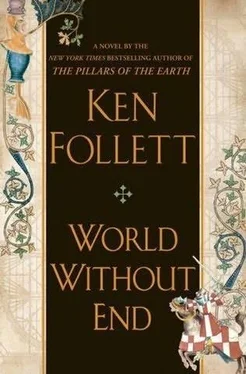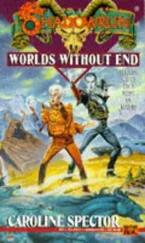Prior Anthony might be an old woman, but he had at least been man enough to complain about Sir Gerald’s unpaid debts. He had gone to Gerald’s overlord, the present earl of Shiring, who happened also to be Gerald’s second cousin. Earl Roland had summoned Gerald to Kingsbridge today to meet with the prior and work out some resolution. Hence Father’s bad temper.
Then Father was robbed.
He discovered the loss after the All Hallows service. Merthin had enjoyed the drama: the darkness, the weird noises, the music beginning so quietly and then swelling until it seemed to fill the huge church, and finally the slow illumination of candles. He had also noticed, as the lights began to come on, that some people had been taking advantage of the darkness to commit minor sins for which they could now be forgiven: he had seen two monks hastily stop kissing, and a sly merchant remove his hand from the plump breast of a smiling woman who appeared to be someone else’s wife. Merthin was still in an excited mood when they returned to the hospital.
As they were waiting for the nuns to serve breakfast, a kitchen boy passed through the room and went up the stairs carrying a tray with a big jug of ale and a platter of hot salt beef. Mother said grumpily: “I would think your relative, the earl, might invite us to breakfast with him in his private room. After all, your grandmother was sister to his grandfather.”
Father replied: “If you don’t want porridge, we can go to the tavern.”
Merthin’s ears pricked up. He liked tavern breakfasts of new bread and salt butter. But Mother said: “We can’t afford it.”
“We can,” Father said, feeling for his purse; and that was when he realized it was gone.
At first he looked around the floor, as if it might have fallen; then he noticed the cut ends of the leather thong, and he roared with indignation. Everyone looked at him except Mother, who turned away, and Merthin heard her mutter: “That was all the money we had.”
Father glared accusingly at the other guests in the hospital. The long scar that ran from his right temple to his left eye seemed to darken with rage. The room went quiet with tension: an angry knight was dangerous, even one who was evidently down on his luck.
Then Mother said: “You were robbed in the church, no doubt.”
Merthin guessed that must be right. In the darkness, people had been stealing more than kisses.
“Sacrilege, too!” said Father.
“I expect it happened when you picked up that little girl,” Mother went on. Her face was twisted, as if she had swallowed something bitter. “The thief probably reached around your waist from behind.”
“He must be found!” Father roared.
The young monk called Godwyn spoke up. “I’m very sorry this has happened, Sir Gerald,” he said. “I will go and tell John Constable right away. He can look out for a poor townsman who has suddenly become rich.”
That seemed to Merthin a very unpromising plan. There were thousands of townspeople and hundreds more visitors. The constable could not observe them all.
But Father was slightly mollified. “The rogue shall hang!” he said in a voice a little less loud.
“And, meanwhile, perhaps you and Lady Maud, and your sons, would do us the honour of sitting at the table that is being set up in front of the altar,” Godwyn said smoothly.
Father grunted. He was pleased, Merthin knew, to be accorded higher status than the mass of guests, who would eat sitting on the floor where they had slept.
The moment of potential violence passed, and Merthin relaxed a little; but, as the four of them took their seats, he wondered anxiously what would happen to the family now. His father was a brave soldier – everyone said that. Sir Gerald had fought for the old king at Boroughbridge, where a Lancashire rebel’s sword had given him the scar on his forehead. But he was unlucky. Some knights came home from battle with booty: plundered jewels, a cartload of costly Flemish cloth and Italian silk, or the beloved father of a noble family who could be ransomed for a thousand pounds. Sir Gerald never seemed to get much loot. But he still had to buy weapons, armour, and an expensive warhorse to enable him to do his duty and serve the king; and somehow the rents from his lands were never enough. So, against Mother’s will, he had started to borrow.
The kitchen hands brought in a steaming cauldron. Sir Gerald’s family were served first. The porridge was made with barley and flavoured with rosemary and salt. Ralph, who did not understand the family crisis, started to talk excitedly about the All Hallows service, but the glum silence in which his comments were received shut him up.
When the porridge was eaten, Merthin went to the altar. Behind it he had stashed his bow and arrows. People would hesitate to steal something from an altar. They might overcome their fears, if the reward were tempting enough, but a homemade bow was not much of a prize; and, sure enough, it was still there.
He was proud of it. It was small, of course: to bend a full-size, six-foot bow took all the strength of a grown man. Merthin’s was four foot long, and slender, but in other respects it was just like the standard English longbow that had killed so many Scots mountain men, Welsh rebels, and French knights in armour.
Father had not previously commented on the bow, and now he looked at it as if seeing it for the first time. “Where did you get the stave?” he said. “They’re costly.”
“Not this one – it’s too short. A bowyer gave it me.”
Father nodded. “Apart from that it’s a perfect stave,” he said. “It’s taken from the inside of the yew, where the sapwood meets the heartwood.” He pointed to the two different colours.
“I know,” Merthin said eagerly. He did not often get the chance to impress his father. “The stretchy sapwood is best for the front of the bow, because it pulls back to its original shape; and the hard heartwood is best for the inside of the curve, because it pushes back when the bow is bent inwards.”
“Exactly,” Father said. He handed the bow back. “But remember, this is not a nobleman’s weapon. Knights’ sons do not become archers. Give it to some peasant boy.”
Merthin was crestfallen. “I haven’t even tried it yet!”
Mother intervened. “Let them play,” she said. “They’re only boys.”
“True,” Father said, losing interest. “I wonder if those monks would bring us a jug of ale?”
“Off you go,” Mother said. “Merthin, take care of your brother.”
Father grunted. “More likely to be the other way around.”
Merthin was stung. Father had no idea what went on. Merthin could look after himself, but Ralph on his own would get into fights. However, Merthin knew better than to take issue with his father in this mood, and he left the hospital without saying anything. Ralph trailed behind him.
It was a clear, cold November day, and the sky was roofed with high pale-grey cloud. They left the cathedral close and walked down the main street, passing Fish Lane, Leather Yard and Cookshop Street. At the bottom of the hill they crossed the wooden bridge over the river, leaving the old city for the suburb called Newtown. Here the streets of timber houses ran between pastures and gardens. Merthin led the way to a meadow called Lovers’ Field. There, the town constable and his deputies had set up butts – targets for archery. Shooting practice after church was compulsory for all men, by order of the king.
Enforcement was not much needed: it was no hardship to loose off a few arrows on a Sunday morning, and a hundred or so of the young men of the town were lining up for their turn, watched by women, children, and men who considered themselves too old, or too dignified, to be archers. Some had their own weapons. For those too poor to afford a bow, John Constable had inexpensive practice bows made of ash or hazel.
Читать дальше












